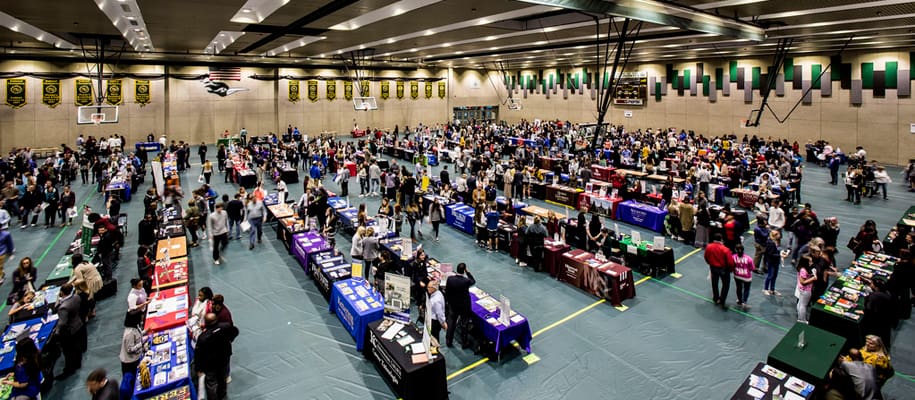You’ve seen the fliers around school (and to the right): College Fair! All high school students invited!
But what is a college fair? Are they even helpful, or are they just confusing and intimidating?
A college fair is an event in which representatives from various colleges set up booths and share information about their college with high school students. It can indeed be overwhelming–it’s a little like a busy flea market, but instead of selling vintage Tupperware and Beanie Babies, the reps are peddling their school’s virtues and asking for your contact information. (You’ll also likely come home with a lifetime’s supply of pens.)
Visiting a college is still the best way to know whether it’s the place for you, but the benefit of a college fair is that you can gather a lot of information in a single location over the course of an hour or two. Another benefit is that you may learn of a college that you hadn’t considered before. It’s also a chance to meet with the rep who could well be the person who reads your application–it never hurts to make a positive impression!
So how do you make the best use of your time?
- Find out which colleges will be attending. Do some preliminary research and make a list of the schools you’re most interested in.
- Make sure to pick up a bag to store literature in–bags and maps can usually be found at the entrance. Bring a notebook for taking notes (or use a note-taking app on your phone).
- Make a list of questions you want to ask. What factors are most important to you when choosing a college? Ask about them! But don’t be vague or ask something you can easily Google. Asking “Do you have a biology major?” or “Is your business program good?” will not impress. Much better to ask what kind of research opportunities are offered to biology students, or what companies offer internships to their business majors. See my list of questions at the end of this post for more ideas.
- Use the QR code on the flier or click HERE to register ahead of time. In the old days, we used to fill out postcards with our contact information at each college table. Now, you can register in advance and get a barcode that reps can scan. That will allow you to spend your time talking to the rep instead of writing your email address over and over.
- If you like a college, make sure to get the rep’s contact information.
- After you visit a booth, jot down a few notes to help you remember pertinent information and your impressions before moving on. You’d be surprised at how quickly colleges can become jumbled up in your head.
- Some college booths are always busy and it can be difficult to get a chance to talk with the rep. Don’t be afraid to just stand and listen as they answer questions from others. In this situation, eavesdropping is not rude. (But do try to get the rep to scan your info and register your interest with the college, even if you don’t have time to talk individually.)
- Be flexible: make sure to see the colleges on your list, but be willing to visit other booths, as well. You may be surprised and discover a college you hadn’t considered before. In fact, I encourage you to randomly drop by at least two colleges that you’ve never heard of.
- After the fair, review your notes and add to them. Consider sending a brief thank you email to the reps you spoke to.
Possible questions:
- What makes your college unique from other schools of a similar size?
- What do students like most about your college? What do students complain about?
- What sort of student is happiest at your school?
- If you know what you want to major in: What are recent outcomes for students in my major? What kinds of internships and research opportunities are available?
- For nursing, business, engineering: Is this a direct-entry program?
- For fine/performing arts: What is the application process? Do I have to audition or submit a portfolio?
- For pre-professional programs (law, medicine, veterinary, physical therapy, etc.): What percentage of your students is admitted to med/law/etc. school?
- Are certain majors more competitive to gain admission to than others?
- What criteria are most important to you when you evaluate an application?
- Will my classes be taught by a professor or a graduate student?
- What percentage of your students graduate in four years?
- How would you describe the academic pressure and workload?
- What study abroad options are available?
- What percentage of your students is involved in Greek life?
- Does the college have any unique traditions?
- What do students do for fun? Where do they hang out? Do most students stay on campus on the weekends?
- Tell me about the local area.
- What is the average financial aid award offered to first-year students? Do you have any department-specific scholarships, or scholarships related to fine/performing arts or sports?

